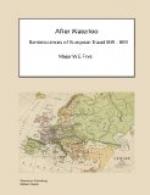I have witnessed an interesting spectacle in the Grosser Garten. The pond or basin is completely frozen over, and a Russian Prince, Gallitzin, who is here, has fitted up a sort of Montagnes Russes as they are called. Blocks of ice are placed on an inclined plane to the top of which you mount by means of a staircase; and then, seating yourself in a sort of sledge, you slide down the inclined plane with immense velocity. The Prince often persuades a lady to sit on this sleigh on his lap and descend together; and this no doubt serves to break the ice of many an amorous intrigue. This construction of the Prince Gallitzin has contributed to fill the Grosser Garten with the beau monde, every day from twelve to two o’clock; so that you see we are in no want of amusements at Dresden.
The King frequently attends the theatre; he is a tall, fine looking man, and is usually dressed in the uniform of his Foot-Guards, which is scarlet faced with yellow. The poor King has taken much to heart the injustice with which he has been treated by the coalition, and no doubt will not easily forget the ill-bred and insolent letter of Castlereagh to the Congress, wherein he said that the King of Saxony deserved to lose his dominions for adhering to Napoleon. But how the King of Saxony could act otherwise I am at a loss to find: so little could he possibly deserve this treatment for adhering to Napoleon, that had his advice been taken in the year 1805, the French would never have been able to extend their conquests so far, nor to dictate laws to Germany. But Lord Castlereagh seems to have either never known or wilfully forgotten the anterior political conduct of Saxony. Had he been more versed in German affairs, or had studied with more accuracy the events passing before his eyes, it would have been a check upon his arrogance; but here was a genuine disciple of the Pitt school (that school of ignorance and insolence), who sets himself up as the moral regenerator of nations and as a distributor of provinces, while he is grossly ignorant of the political system of the country on whose destinies he pretends to decide so peremptorily. Had Castlereagh paid attention to what was going forward in Germany in 1805, he would have seen too that of all powers Prussia was the very last who with any shadow of justice could pretend to an indemnification at the expense of Saxony. In the year 1805, the King, then Elector of Saxony, strongly advised the Prussian Cabinet to forget its ancient rivalry and jealousy of Austria and to coalesce with the latter power, in resisting the encroachments of Napoleon, in order to prevent the latter from attempting the overthrow of the whole fabric of the constitution of the Holy Roman Empire, with the intricacy and fragility of which no prince in Germany was better acquainted than the Elector of Saxony. Prussia however was still reluctant to engage in the contest and gave no support whatever to Austria. Napoleon defeats




